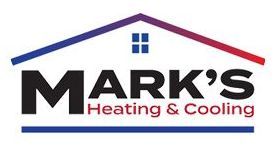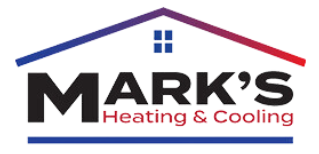Expert Cooling Repair & R‑410A Guidance
When summer temperatures soar in the KC metro area, you need an air‑conditioning partner who can diagnose problems fast and repair them right the first time. At Mark’s Heating & Cooling, our technicians are experts in air‑conditioner repair and maintenance no matter the distributor, and always stay up to date on the latest industry regulatory changes.
Air Conditioner Repair
Even the most reliable air conditioners give off warning signals before a full‑blown breakdown. Spotting these cues early can save you money, prevent major component failure, and keep your home comfortable when temperatures spike.
Warm Air from the Vents – Often caused by low refrigerant, compressor trouble, or a metering restriction.
Short Cycling – Rapid starts and stops that signal dirty coils, a bad capacitor, or an oversized unit.
Unusual Noises – Grinding or rattling from loose or worn internal components.
Ice on the Indoor or Outdoor Coil – Frost indicates airflow issues or a refrigerant leak that can ruin the compressor.
Spiking Energy Bills – A hidden mechanical or airflow problem is forcing the system to overwork.
Musty or Burning Odors – Mold on wet coils or overheating electrical parts that need urgent service.
The 2025 Refrigerant Transition Explained
Beginning January 1, 2025, new air conditioning systems must use lower global warming potential (GWP) refrigerants to help reduce their environmental impact. Consequently, the EPA is mandating a ban on R-410A, which replaced R-22 in 2010 due to its high GWP. Now, manufacturers are transitioning to R-454B and R-32 — refrigerants known for their significantly lower GWP levels.
What the Phase‑Out Means for Homeowners
- Your Current System Isn’t Illegal – Existing R‑410A equipment can still be serviced, and manufacturers may produce R‑410A components for repair use only.
- Refrigerant Will Become Scarcer & Pricier – Because supply will rely increasingly on reclaimed product, expect costs to rise, especially if your system develops a leak.
- Average Lifespan Matters – Most air conditioners last 12–15 years. Units installed around 2010, when R‑410A was introduced, are nearing the age where it may be more cost‑effective to purchase a new, compliant system than to continue repairing the outdated one.
Refrigerant FAQs
We understand that industry changes can be confusing, so we've complied a list of the top questions about the new refrigerant changes.
-
How do I know what refrigerant my unit uses?
Look for the data sticker on the outdoor condenser. If it lists R‑22, HCFC‑22, or R‑410A, the refrigerant is banned and subject to phase‑out rules. New labels will show R‑454B or R‑32, which are acceptable under the EPA.
-
Can I change the refrigerant myself, and does any refrigerant work?
No. Federal law regulations allow only certified technicians to handle refrigerants, and it is illegal to retrofit a system designed for one refrigerant to another. R‑454B and R‑32 operate at different pressures and have different chemical properties.
-
What refrigerants are allowed?
For new systems, the EPA currently lists R‑454B and R‑32 as acceptable low‑GWP options.
-
Do I need to buy a new AC immediately?
Not necessarily. If your system is under 10 years old and leak‑free, repairing it may still be cost‑effective. However, repeated refrigerant leaks or major component failures could make upgrading to a compliant, high‑efficiency model the more cost-effective, long‑term choice.
Prevent Costly Repairs with Proactive Maintenance
Routine tune‑ups are the easiest way to avoid emergency breakdowns and refrigerant leaks. During a Mark’s Heating & Cooling maintenance visit, we:
- Inspect coils, capacitors, contactors, and motors for early wear
- Check refrigerant pressures and pinpoint leaks before they empty the system
- Clean condensate drains to prevent water damage and mold growth
- Calibrate thermostats and verify airflow for maximum efficiency
A well‑maintained system runs 20‑30 percent more efficiently and is far less likely to suffer catastrophic compressor failure—saving you money and stress season after season.
AC Repair Specialist No Matter the Brand
We service all brands of air conditioners, so no matter what unit you have, you can trust us to diagnose the issue and get your home cool again quickly. For installs, we work with some of the top brands like HEIL, YORK, and BOSCH to ensure you're set up right from day one.



Ready for Reliable Cooling Repair?
If your air conditioner is acting up—or you’re concerned about the upcoming refrigerant transition—call
Mark’s Heating & Cooling!
cooling repair page contact form
We will get back to you as soon as possible
Please try again later
Expert Cooling Repair & R‑410A Guidance
When summer temperatures soar in the KC metro area, you need an air‑conditioning partner who can diagnose problems fast and repair them right the first time. At Mark’s Heating & Cooling, our technicians are experts in air‑conditioner repair and maintenance no matter the distributor, and always stay up to date on the latest industry regulatory changes.
Air Conditioner Repair
Even the most reliable air conditioners give off warning signals before a full‑blown breakdown. Spotting these cues early can save you money, prevent major component failure, and keep your home comfortable when temperatures spike.
Warm Air from the Vents – Often caused by low refrigerant, compressor trouble, or a metering restriction.
Short Cycling – Rapid starts and stops that signal dirty coils, a bad capacitor, or an oversized unit.
Unusual Noises – Grinding or rattling from loose or worn internal components.
Ice on the Indoor or Outdoor Coil – Frost indicates airflow issues or a refrigerant leak that can ruin the compressor.
Spiking Energy Bills – A hidden mechanical or airflow problem is forcing the system to overwork.
Musty or Burning Odors – Mold on wet coils or overheating electrical parts that need urgent service.
The 2025 Refrigerant Transition Explained
Beginning January 1, 2025, new air conditioning systems must use lower global warming potential (GWP) refrigerants to help reduce their environmental impact. Consequently, the EPA is mandating a ban on R-410A, which replaced R-22 in 2010 due to its high GWP. Now, manufacturers are transitioning to R-454B and R-32—refrigerants known for their significantly lower GWP levels.
What the Phase‑Out Means for Homeowners
- Your Current System Isn’t Illegal – Existing R‑410A equipment can still be serviced, and manufacturers may produce R‑410A components for repair use only.
- Refrigerant Will Become Scarcer & Pricier – Because supply will rely increasingly on reclaimed product, expect costs to rise, especially if your system develops a leak.
- Average Lifespan Matters – Most air conditioners last 12–15 years. Units installed around 2010, when R‑410A was introduced, are nearing the age where it may be more cost‑effective to purchase a new compliant system than to continue repairing the outdated one.
Refrigerant FAQs
We understand that industry changes can be confusing, so we've complied a list of the top questions about the new refrigerant changes.
-
How do I know what refrigerant my unit uses?
Look for the data sticker on the outdoor condenser. If it lists R‑22, HCFC‑22, or R‑410A, the refrigerant is banned and subject to phase‑out rules. New labels will show R‑454B or R‑32, which are acceptable under the EPA.
-
Can I change the refrigerant myself, and does any refrigerant work?
No. Federal law regulations allow only certified technicians to handle refrigerants, and it is illegal to retrofit a system designed for one refrigerant to another. R‑454B and R‑32 operate at different pressures and have different chemical properties.
-
What refrigerants are allowed?
For new systems, the EPA currently lists R‑454B and R‑32 as acceptable low‑GWP options.
-
Do I need to buy a new AC immediately?
Not necessarily. If your system is under 10 years old and leak‑free, repairing it may still be cost‑effective. However, repeated refrigerant leaks or major component failures could make upgrading to a compliant, high‑efficiency model the more cost-effective, long‑term choice.
Prevent Costly Repairs with Proactive Maintenance
Routine tune‑ups are the easiest way to avoid emergency breakdowns and refrigerant leaks. During a Mark’s Heating & Cooling maintenance visit, we:
- Inspect coils, capacitors, contactors, and motors for early wear
- Check refrigerant pressures and pinpoint leaks before they empty the system
- Clean condensate drains to prevent water damage and mold growth
- Calibrate thermostats and verify airflow for maximum efficiency
A well‑maintained system runs 20‑30 percent more efficiently and is far less likely to suffer catastrophic compressor failure—saving you money and stress season after season.
AC Repair Specialist No Matter the Brand
We service all brands of air conditioners, so no matter what unit you have, you can trust us to diagnose the issue and get your home cool again quickly. For installs, we work with some of the top brands like HEIL, YORK, and BOSCH to ensure you're set up right from day one.



Ready for Reliable Cooling Repair?
If your air conditioner is acting up—or you’re concerned about the upcoming refrigerant transition—call
Mark’s Heating & Cooling!
cooling repair page contact form
We will get back to you as soon as possible
Please try again later



